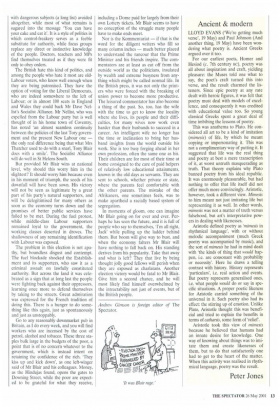Ancient & modern
LLOYD EVANS ('We're getting much verse', 19 May) and Paul Johnson (And another thing, 19 May) have been wondering what poetry is. Ancient Greeks argued over it too.
For our earliest poets, Homer and Hesiod (c. 7th century BC), poetry was all about inspiration and craft, yielding pleasure: the Muses told one what to say, the poet's craft turned this into verse, and the result charmed the listeners. Since epic poetry at any rate dealt with heroic figures, it was felt that poetry must deal with models of excellence, and consequently it was credited with educational value too. So young classical Greeks spent a great deal of time imbibing the lessons of poetry.
This was anathema to Plato. He considered all art to be a kind of imitation (mimesis) of life, by which he meant copying or impersonating it. This was not a complimentary way of putting it. It suggested that life was the real thing and poetry at best a mere transcription of it, at worst untruth masquerading as truth. That theory explains why Plato banned poetry from his ideal republic. It was enormously pleasurable, but had nothing to offer that life itself did not offer much more convincingly. Aristotle, however, took a different view. Mimesis to him meant not just imitating life but representing it as well. In other words, mimesis was not a matter of truth versus falsehood, but art's interpretative powers in dealing with likenesses.
Aristotle defined poetry as 'mimesis in rhythmical language', with or without melodic accompaniment (much Greek poetry was accompanied by music), and the sort of mimesis he had in mind dealt with 'the kinds of thing that would happen, i.e. are consonant with probability or necessity'. Here he draws a telling contrast with history. History represents 'particulars', i.e. real action and events. But poetry represents generalised ones, i.e. what people would do or say in specific situations. A proper poetic likeness for Aristotle carried something of the universal in it. Such poetry also had its effect: the stirring up of emotion. Unlike Plato, Aristotle thought this was beneficial and tried to explain the benefits in terms of catharsis, some form of 'relief'.
Aristotle took this view of mimesis because he believed that humans had an innate desire for knowledge. One way of knowing about things was to imitate them and create likenesses of them, but to do that satisfactorily one had to get to the heart of the matter. When this activity was realised in rhythmical language, poetry was the result.
Peter Jones


















































































 Previous page
Previous page